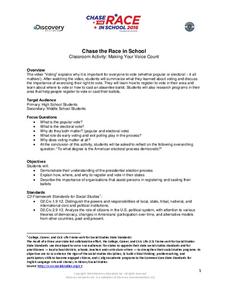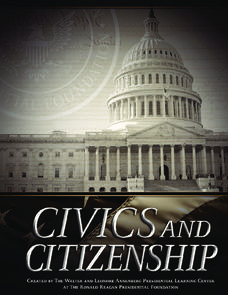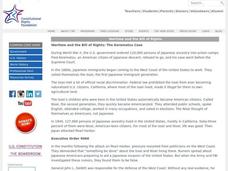Curated OER
We the People... How Does Government Secure Natural Rights?
Students investigate the Founders' ideas about what kind of government is most likely to protect the basic rights of people. They distinguish between limited and unlimited government.
Curated OER
Citizenship Worksheet 2 - A Government of Laws
In this citizenship and government laws worksheet, learners identify what the United States government provides for its citizens, the foundations of that government, the principles of the Constitution, any amendments to the Constitution,...
Curated OER
Flag Burning: Worksheet
In this Bill of Rights worksheet, students respond to 10 short answer questions that require them to agree or disagree with 10 statements about flag burning and citizen's rights.
School Improvement in Maryland
Dividing the Powers of Government
Who does what? To develop an understanding of the balance of power between the US federal and state governments, class members research responsibilities in terms of legal systems, security issues, economic activities, lawmaking, and...
University of Arkansas
Promises Denied
"Promises Denied," the second instructional activity in a unit that asks learners to consider the responsibilities individuals have to uphold human rights, looks at documents that illustrate the difficulty the US has had trying to live...
Center for Civic Education
What Is Authority?
Young scholars examine the concepts of power and authority as they begin learning about government in this elementary social studies lesson. Through a series of readings, discussions, and problem solving activities, children learn about...
Discovery Education
Making Your Voice Count
As learners watch a video on voting, they take notes on a worksheet that lists various voting topics, including electoral and popular votes, early voting, and exit polling. Then, young people research the Internet for their state's...
Australian National Schools Network
Civics and Citizenship
What is a good citizen? Here is a fantastic unit of ten lessons that will thoroughly cover the concept of civics and citizenship in your class. Examples of activities include learning stations, primary and secondary source analysis of...
Curated OER
Ranking The Bill of Rights
Students examine the Bill of Rights and determine if the document is outdated. After a discussion of the amendments, students rank the amendments in the Bill of Rights and explain their order of importance. Students research the...
Curated OER
Civil liberties: Other freedoms
Learners expore civil liberties. They identify and define legal rights. Students consider the impact of applying rights in criminal matters. They identify Canadians' political rights and suggest why they are essential to a democracy....
Curated OER
Who Follows the Universal Declaration of Human Rights?
Students examine how countries relate to te Universal Declaration of Human Rights. Working in pairs, they create definitions of human rights and explain why the Declarqation is important. Groups of students uncover examples of human...
Constitutional Rights Foundation
Purged From the Voter Rolls: Husted v. A. Philip Randolph Institute
Once a registered voter isn't always a registered voter. Academics explore the topic of voter registration and hindrances to remaining registered. The resource focuses on data analysis, federal voter registration law, and Supreme Court...
Curated OER
Getting Out the Vote: An Election Day Classroom Experiment
Students explore through a hands-on experiment why voting is important. They examine the potential impact of deciding not to vote. They they have the opportunity to vote in a mock presidential election if they choose to.
Center for Civic Education
Constitution Day Rap
Engage your class while learning about the US Constitution with this fun primary grade social studies lesson. After viewing a picture of the US Constitution, young learners piece together a US flag using stars and stripes with facts...
Center for Civic Education
To Amend or Not to Amend, That's Been the Question...Many Times
Looking for some ideas for how to celebrate September 17, Constitution Day? Check out a packet that focuses on the factors that are considered in the amendment process. Class members examine the amendment process and the types of...
Center for Civic Education
The Power of Nonviolence: Change Through Strategic Nonviolent Action
How did major historical figures, such as Henry David Thoreau, Susan B. Anthony, and Mohandas K. Gandhi, explain and defend their beliefs in nonviolence? Your learners will begin by studying the backgrounds of these individuals, and then...
Carolina K-12
Preventing Voter Fraud or Encouraging Voter Suppression?
The issues of voter fraud and voter suppression are relevant in every election, local as well as national. Soon-to-be voters learn about a recent bill proposed in North Carolina, the Voter Information and Verification Act, and decide for...
Curated OER
What does it mean to be a citizen?
Students examine democracy and the role of a citizen. They contrast rights and responsibilities of individuals, groups, and organizations. Students identify two forms of democratic action and describe demoncratic values. Students observe...
Curated OER
Ex Parte Milligan
Pupils reserach the case of Ex Parte Milligan. They explore the influence of the Supreme Court and the court decisions on the rights and responsibilities of citizens. They read Milligan's letter to Stanton and generate questions about...
Curated OER
Civics: Juvenile Justice in Missouri
Students investigate their rights and responsibilities as juveniles in the Missouri legal system. After taking a poll on juvenile justice, they discuss their responses and suggest changes which they could send to the state legislature. ...
Curated OER
FROM STUDENT TO GLOBAL CITIZEN
Learners develop an awareness of citizenship and how it's defined globally. They explore the cultural diversity of different types of communities around the world. In addition, they assess the rights and responsibilities that are...
Curated OER
Governance - Grade 8
Eighth graders participate in talking circles. In this self-governance lesson, 8th graders examine human rights from the perspective of Native Americans. Students discuss the Canadian Charter of Rights and Freedoms as well as "Interview:...
Curated OER
Wartime and the Bill of Rights: The Korematsu Case
Learners examine the balance between civil liberties and protection. In this national security lesson, students explore the Korematsu case which references the Japanese internment camps of World War II. Learners draw comparisons between...
Curated OER
The Right to Know
Students discuss their knowledge of the position of National Security Advisor. They read and discuss a newspaper article about national security and intelligence as it relates to terrorism and the public's right to know.

























